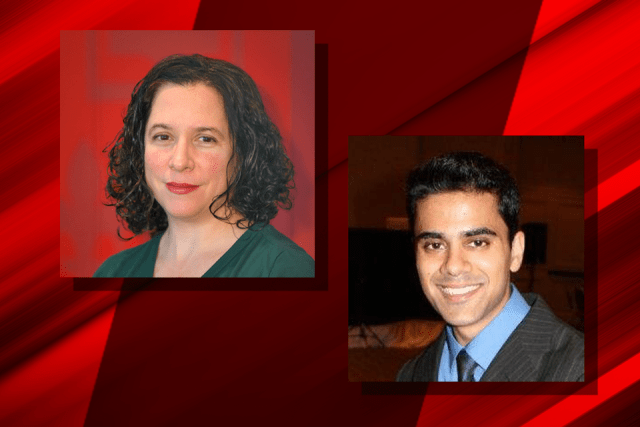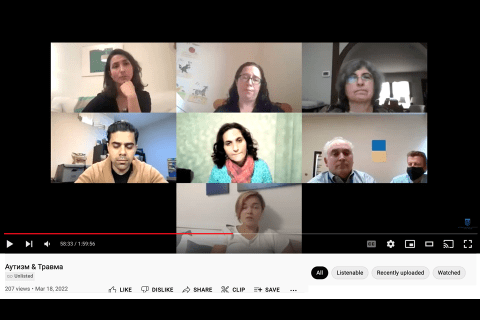
Concern about the challenges being faced by children on the autism spectrum living in war-torn Ukraine motivated autism researcher Lauren Moskowitz, Ph.D., Associate Professor, Department of Psychology, and Imad Zaheer, Assistant Professor, Department of Psychology, to organize a global Zoom discussion panel recently with autism authorities, trauma experts, and parents of autistic children in Ukraine.
The panel emerged from their need to overcome the powerlessness they felt knowing the number of autistic children in Ukraine impacted by the conflict.
“It’s hard to feel powerless,” Dr. Moskowitz said. “We just wanted to use whatever knowledge and skills we have to help families in Ukraine.”
The discussion, facilitated by interpreters fluent in English, Ukrainian, and Russian, was designed to isolate issues faced by autistic children living on the front lines of war. “These children face such unique and unprecedented circumstances,” Dr. Moskowitz explained. “They are constantly threatened. You can count on one hand the number of people who are experts in trauma and autism together, and they were all on this panel.”
The professors convened the panel in mid-March, about a month after Russia’s invasion of Ukraine. In so doing, they joined Michael R. Sampson, Ph.D., Professor, Education Specialties, in reaching out to those impacted by the conflict.
Dr. Sampson, a Fulbright scholar to Ukraine, was evacuated to Poland shortly before the invasion. He has spent the time since shuttling displaced Ukrainians across the border to safety in Poland.
Meanwhile, Dr. Moskowitz was uncertain how many Ukrainian families would participate in the live Zoom meeting. As it happened, more than 300 families logged in. The discussion was uploaded to YouTube, where it has since been viewed by more than 500 people.
The panelists explored the physical and psychological manifestations of trauma, sensory distress, and coping mechanisms demonstrated by autistic children, and steps parents might consider taking to mitigate the extreme anxiety demonstrated by autistic children living in a war zone.

Besides teaching at St. John’s, Dr. Zaheer is an expert on implementation sciences and the science of systems change. His expertise was essential to implementing the ideas emerging from the meeting. “Many people experience challenges amid trauma,” he said. “But the autistic population as a subgroup is often ignored. There have been so many wars in recent human history, and we know autistic people were there, but they were largely invisible in studies.”
Others on the panel included autism researchers Sarah Dababnah, Ph.D., of the University of Maryland, and Connor Kerns, Ph.D., of the University of British Columbia; psychiatrist Peter D’Amico, Ph.D.; psychologist Juliet Vogel, Ph.D.; and Ukraine-based autism advocate Dariya Orlova-Zhernovaya, herself autistic.
Wartime conditions create heightened fear among autistic children, many of whom already manifest anxiety, Dr. Moskowitz said. These can include a sense of being physically or psychologically trapped, a limited ability to adapt to wartime realities, and a sense of lost personal control.
Panelists advised the Ukrainian parents to expect an increase in challenging behaviors among their children as the conflict continues. These could include self-injury and aggressiveness. Autistic children, the panelists said, have no better way of expressing insecurities.
“When you deal with trauma, the threat is often eventually removed,” Dr. Moskowitz said. “But here, people are constantly threatened. They’re hearing bombs being dropped all day, and kids with autism have sensory sensitivity as it is.”
What’s more, displaced families, forced to leave home at a moment’s notice, might have few of the things necessary to ease an autistic child’s fears. Such items can include a child’s favorite toys, crayons, and electronic devices.
But what happens, say, if a child’s iPad is broken or toys have been left behind? “A lot of the things we would do to ease a child’s anxiety don’t apply,” Dr. Moskowitz said.
Parents still have options, panelists said. Detailed information and behavioral expectations help, as does positive reinforcement of good behavior.
Innovation is sometimes required, too, Dr. Zaheer said. “For example, we use timers to ease stressful situations among autistic children, but a family running out of its house might not be looking for a timer. I thought of an idea where we all came up with a song whose length we know.”
When faced with wartime trauma, it’s best for parents of autistic children to clarify upcoming activities to help children gain a sense of control over their environment. “These children face such unique and unprecedented circumstances,” Dr. Moskowitz said. “There are no easy answers to these issues, but we wanted to help.”
Related News
Q&A with Christopher E. Fisher, Psy.D. ’14M.S.Ed., LEAD Honoree
Christopher E. Fisher, Psy.D. ’14M.S.Ed., Licensed Clinical Psychologist and Director, Behavioral Health in Zucker Hillside Hospital, will be among several alumni honored by The School of Education...
Q&A with Alicia Calabrese ’94SJC., LEAD Honoree
Alicia Calabrese ’94SJC, Principal of Floral Park Memorial High School, will be among several alumni honored by The School of Education (TSOE) at the 15th Annual Leaders in Education Awards Dinner...
Q&A with Brenda Almendarez-De Bello ’06M.S.Ed., ’19Ed.D., LEAD Honoree
Brenda Almendarez-De Bello ’06M.S.Ed., ’19Ed.D., Principal of Tamarac Elementary School in the Sachem Central School District , will be among several alumni honored by The School of Education (SOE) at...
